|
|
|
Sort Order |
|
|
|
Items / Page
|
|
|
|
|
|
|
| Srl | Item |
| 1 |
ID:
121256
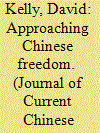

|
|
|
|
|
| Publication |
2013.
|
| Summary/Abstract |
The rise of stability preservation to dominance in the political
order coincided with a highly charged debate over "universal values" and
a closely related discussion of a "China Model". This paper analyses the
critique of universal values as a "wedge issue" that is used to pre-empt
criticism of the party-state by appealing to nationalism and cultural essentialism. Taking freedom as a case in point of a universal value, it
shows that, while more developed in the West, freedom has an authentic
Chinese history with key watersheds in the late Qing reception of popular sovereignty and the ending of the Maoist era. The work of Wang
Ruoshui, Qin Hui and Xu Jilin display some of the resources liberals
now bring to "de-wedging" universal values, not least freedom. They
share a refusal to regard "Western" values as essentially hostile to Chinese.
|
|
|
|
|
|
|
|
|
|
|
|
|
|
|
|
| 2 |
ID:
154070
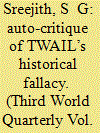

|
|
|
|
|
| Summary/Abstract |
Third World Approaches to International Law (TWAIL) has been impactful in international law scholarship. However, many of its epistemic approaches, especially its active historicising, have often turned counterproductive to its objective of securing freedom for the peoples of the Third World. Moreover, pursuing the colonial past through weighty polemics has rendered TWAIL a discourse that engenders anti-Western sentiments. Further, TWAIL’s dialectic means of resistance and opposition to a past-influenced present ingrained in international law and systems, which are at the disposal of the West, have the reverse effect of dialectically imposing a Western otherness on TWAIL. Hence, an alternative manifesto is sketched, which, while it disagrees with the exclusion of the West in social production, refuses to privilege the West through a Hegelian dialectic of otherness. The alternative manifesto proposes an alternative dialectic wherein the otherness is a ‘universal’ in the self-consciousness of the subjects. It is a dialectic of inclusion and open participation. The article also attempts to situate the new dialectic in international law.
|
|
|
|
|
|
|
|
|
|
|
|
|
|
|
|
| 3 |
ID:
067703
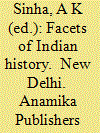

|
|
|
|
|
| Publication |
New Delhi, Anamika Publishers and Distributers, 2006.
|
| Description |
xix, 652p.hbk
|
| Standard Number |
8179751449
|
|
|
|
|
|
|
|
|
|
|
|
Copies: C:1/I:0,R:0,Q:0
Circulation
| Accession# | Call# | Current Location | Status | Policy | Location |
| 050626 | 954/SIN 050626 | Main | On Shelf | General | |
|
|
|
|
| 4 |
ID:
116784
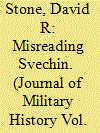

|
|
|
|
|
| Publication |
2012.
|
| Summary/Abstract |
Soviet military theorist Aleksandr Svechin is often misperceived as an advocate of strategies of attrition over destruction or annihilation. In fact, Svechin was an historicist, who saw the precise balance between attrition and annihilation, or defense and offense, as constantly shifting as a result of changing material circumstances. A close examination of his theoretical and historical works reveals the depth of his thinking, while his response to Russia's 1916 Brusilov Offensive shows his support for ambitious strategies of annihilation under the proper circumstances.
|
|
|
|
|
|
|
|
|
|
|
|
|
|
|
|
| 5 |
ID:
114036
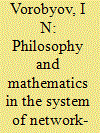

|
|
|
|
|
| Publication |
2012.
|
| Summary/Abstract |
The paper takes a historical view of the role of philosophy as a Weltanschauung science and of mathematics, whose object is the study of spatial and quantitative relations of the real world, in the shaping of military art from antiquity to the present day. It analyzes works on military theory and command activities of prominent military leaders to show the origins of new ideas and military theories, as well as substantiating the inevitable emergence of the network centrism concept.
|
|
|
|
|
|
|
|
|
|
|
|
|
|
|
|
| 6 |
ID:
177737
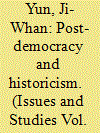

|
|
|
|
|
| Summary/Abstract |
Since Japan’s imposition of export controls against Korea in July 2019 and its following countermoves, including the termination of the General Security of Military Information Agreement, the governments of both countries have presented their own narratives of the origin of this trade war, both of which mirror theories of international politics. Nonetheless, these narratives mask several domestic origins. Most importantly, this paper demonstrates that behind the trade war, there has been a preoccupation of the two governments with mutually irreconcilable version forms of historicism. One is Korea’s pro-naturalist historicism, seeing Korean history as being preordained by the universal laws of human progress and defining Japan as a historical reactionary. The other is Japan’s anti-naturalist historicism, upholding internationalism as a new driving force of history that will transform Japan from a war criminal state into a proper subject in international society while criticizing Korea as being a drag on this transformation. This paper argues that, resulting from decades-long neoliberal politics that have disturbed the state-society balance, the national structure of post-democracy has encouraged each government to push historicism to its limit as an alternative source of political legitimacy in lieu of democratic accountability. Concretely, it shows that post-democracy has determined (1) the historicist framing of emerging conflicts, (2) the government’s legislative struggles to realize historicist policies, and (3) the incontestability of historicist hostility by other ideas in each country.
|
|
|
|
|
|
|
|
|
|
|
|
|
|
|
|
| 7 |
ID:
103613
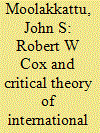

|
|
|
| 8 |
ID:
115030
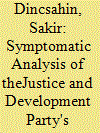

|
|
|
|
|
| Publication |
2012.
|
| Summary/Abstract |
This article focuses on the populist strategy of the Turkish Justice and Development Party between the 2007 presidential election, when Turkish politics experienced an impasse, and the 2010 referendum over the constitutional amendments. As a means of analysing populism, the symptomatic approach is preferred over other theoretical perspectives, including empiricism and historicism. An analysis of the discourse articulated by Prime Minister Erdogan leads us to the conclusion that he has continually appealed to the masses with an anti-institutional rhetoric that divides society into 'the people' and 'the elite', thereby fulfilling the criteria of populism according to the symptomatic approach.
|
|
|
|
|
|
|
|
|
|
|
|
|
|
|
|
| 9 |
ID:
158721
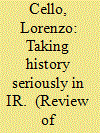

|
|
|
|
|
| Summary/Abstract |
IR scholars have always invoked history as a valuable resource for understanding the present. However, the question of how should we go about investigating and interpreting the past is rarely asked, let alone answered. While most IR approaches are anchored to the attempt to situate oneself outside history – reading the past in terms of the present or in terms of a hypothetical future – this article strives to redress the kind of historical perspective adopted, if at all, by IR scholars. It does so by advancing a distinctive historicist approach that emphasises the importance of understanding past practices and discourses in their own historical and intellectual contexts. In order to substantiate this claim, the article goes on to critically engage with recent calls to historicise intervention in IR, arguing that a historicist mode of analysis represents a corrective to presentism as well as an alternative route into present-day debates.
|
|
|
|
|
|
|
|
|
|
|
|
|
|
|
|
|
|
|
|
|